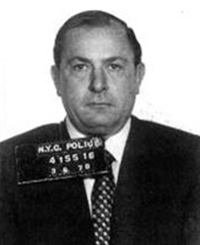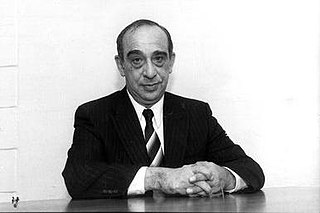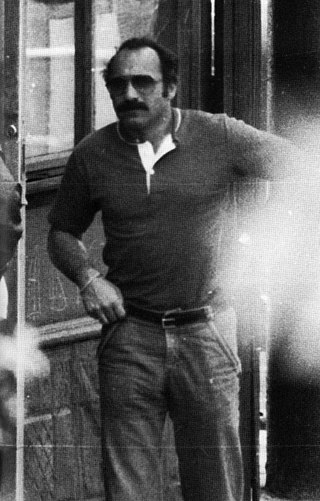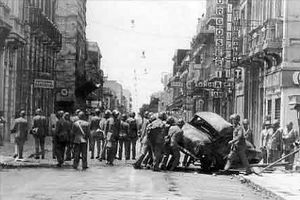Related Research Articles

Joseph Charles Bonanno, sometimes referred to as Joe Bananas, was an Italian-American crime boss of the Bonanno crime family, which he ran from 1931 to 1968.

Carlo Gambino was a Sicilian-American crime boss of the Gambino crime family of New York City. After the Apalachin Meeting in 1957, and the imprisonment of Vito Genovese in 1959, Gambino took over the Commission of the American Mafia until his death from a heart attack on October 15, 1976. During more than 50 years in organized crime, he served only 22 months in prison for a tax evasion charge in 1937.

Joseph Michael Valachi was an American mobster in the Genovese crime family who was the first member of the Italian-American Mafia to acknowledge its existence publicly in 1963. He is credited with the popularization of the term cosa nostra.

Joseph Gallo, also known as "Crazy Joe", was an Italian-American mobster and Caporegime of the Colombo crime family of New York City.

Joseph Anthony Colombo Sr. was the boss of the Colombo crime family, one of the Five Families of the American Mafia in New York City.

Carmine John Persico Jr., also known as "Junior", "The Snake" and "Immortal", was an American mobster and the longtime boss of the Colombo crime family in New York City from 1973 until his death in 2019. He had been serving 32 years in federal prison from 1987 until his death on March 7, 2019.

Joseph Dominick Pistone is an American former FBI agent who worked undercover as Donnie Brasco between September 1976 and July 1981, as part of an infiltration primarily into the Bonanno crime family, and to a lesser extent the Colombo crime family, two of the Five Families of the Mafia in New York City. Pistone was an FBI agent for 17 years, from 1969 until he resigned in 1986. The evidence collected by Pistone led to over 200 indictments and over 100 convictions of Mafia members, and some responsible for his infiltration were also killed by other mobsters.
Consigliere is a position within the leadership structure of the Sicilian, Calabrian, and Italian-American Mafia. The word was popularized in English by the novel The Godfather (1969) and its film adaptation. In the novel, a consigliere is an advisor or counselor to the boss, with the additional responsibility of representing the boss in important meetings both within the boss's crime family and with other crime families.
The Mafia Commission Trial was a criminal trial before the United States District Court for the Southern District of New York in New York City, United States, that lasted from February 25, 1985, until November 19, 1986. Using evidence obtained by the Federal Bureau of Investigation, 11 organized crime figures, including the heads of New York City's "Five Families", were indicted by United States Attorney Rudolph Giuliani under the Racketeer Influenced and Corrupt Organizations Act (RICO) on charges including extortion, labor racketeering, and murder. Eight of them were convicted under RICO, and most were sentenced to 100 years in prison on January 13, 1987, the maximum possible sentence under that law.
The Five Families refer to five Italian American Mafia crime families that operate in New York City. In 1931, the five families were organized by Salvatore Maranzano following his victory in the Castellammarese War.

Salvatore Vincent "Bill" Bonanno was an American mobster who served as consigliere of the Bonanno crime family, and son of crime boss Joseph Bonanno. Later in life, he became a writer and produced films for television about his family.

The Colombo crime family is an Italian American Mafia crime family and is the youngest of the "Five Families" that dominate organized crime activities in New York City within the criminal organization known as the American Mafia. It was during Lucky Luciano's organization of the American Mafia after the Castellammarese War, following the assassinations of "Joe the Boss" Masseria and Salvatore Maranzano, that the gang run by Joseph Profaci became recognized as the Profaci crime family.

Joseph Magliocco, also known as "Joe Malayak" and "Joe Evil Eye", was an Italian-born New York mobster and the boss of the Profaci crime family from 1962 to 1963. In 1963, Magliocco participated in an audacious attempt with Joseph Bonnano to kill other family bosses and take over the Mafia Commission. The attempt failed, and, while his life was spared, he was forced into retirement. Soon after, he died of a heart attack on December 28, 1963.
The Commission is the governing body of the American Mafia, formed in 1931 by Charles "Lucky" Luciano following the Castellammarese War. The Commission replaced the title of capo di tutti i capi, held by Salvatore Maranzano before his murder, with a ruling committee that consists of the bosses of the Five Families of New York City, as well as the boss of the Chicago Outfit and, at various times, the leaders of smaller families, such as Buffalo, Philadelphia, Detroit, and others. The purpose of the Commission was to oversee all Mafia activities in the United States and serve to mediate conflicts among families.
VincenzoAloi is an American mobster involved in stock fraud who briefly served as the acting boss of the Colombo crime family. Vincenzo was also a figure in the Third Colombo War alongside his brother Benny.
The Valachi hearings, also known as the McClellan hearings, investigated organized crime activities across the United States. The hearings were initiated by Arkansas Senator John L. McClellan in 1963. Named after the major government witness against the American Mafia, foot soldier and made man Joseph Valachi, the trial exposed American organized crime to the world through Valachi's televised testimony. At the trial, Valachi was the first member of the Italian-American Mafia to acknowledge its existence publicly, and is credited with popularization of the term cosa nostra. The trial also exposed the hierarchy of the American Mafia, including the Five Families and The Commission.

The Reggio revolt occurred in Reggio Calabria, Italy, from July 1970 to February 1971. The cause of the protests was a government decision to make Catanzaro, not Reggio, regional capital of Calabria. The nomination of a regional capital was the result of a decentralization programme of the Italian government, under which 15 governmental regions were concretized and given their own administrative councils and a measure of local autonomy.
The American Mafia, commonly referred to in North America as the Italian American Mafia, the Mafia, or the Mob, is a highly organized Italian American criminal society and organized crime group. The organization is often referred to by its members as Cosa Nostra and by the American government as La Cosa Nostra (LCN). The organization's name is derived from the original Mafia or Cosa Nostra, the Sicilian Mafia, with "American Mafia" originally referring simply to Mafia groups from Sicily operating in the United States, as the organization initially emerged as an offshoot of the Sicilian Mafia formed by Italian immigrants in the United States. However, the organization gradually evolved into a separate entity partially independent of the original Mafia in Sicily, and it eventually encompassed or absorbed other Italian immigrant and Italian American gangsters and Italian American crime groups active in the United States and Canada that were not of Sicilian origin. In North America, it is often colloquially referred to as the Italian Mafia or Italian Mob, though these terms may also apply to the separate yet related Sicilian Mafia or other organized crime groups in Italy or ethnic Italian crime groups in other countries.
Joseph Iannuzzi Jr.,, also known as "Joe Dogs", "Joe Diner" and "Joe Drywall", was a Gambino crime family associate and FBI informant whose cooperation influenced events surrounding the late 1985 assassination of Gambino family boss Paul Castellano and played an indirect, but valuable, role in the 1985 Mafia Commission Trial. Iannuzzi is the author of several books: The Mafia Cookbook, Cooking on the Lam, and his autobiography Joe Dogs: The Life and Crimes of a Mobster. Iannuzzi died September 20, 2015, in Kerrville, Texas, at the Veterans Administrations Medical Center.
References
- 1 2 3 "Small-time mob boss Joe Colombo's great civil rights crusade". nydailnews.com. August 14, 2017. Archived from the original on January 4, 2020. Retrieved January 4, 2020.
- ↑ "Thousands of Italians Here Rally Against Ethnic Slurs". The New York Times . June 30, 1970. Archived from the original on January 4, 2020. Retrieved January 4, 2020.
- ↑ "Italo-Americans Press Unity Day" (PDF). New York Times. June 18, 1970. Archived from the original on 5 September 2020. Retrieved 9 November 2011.
- 1 2 Vincenza Scarpaci (2008). The Journey of the Italians in America. Pelican. ISBN 9781455606832. Archived from the original on 2020-09-05. Retrieved 2020-01-04.
- ↑ "Watch Days of Fury (1979) on the Internet Archive". 1979.
- ↑ "Colombo Acquitted In Conspiracy Case". The New York Times . February 27, 1971. Archived from the original on January 4, 2020. Retrieved January 4, 2020.
- ↑ Dreyfuss, Joel (March 27, 1971). "Italian-Americans claim ethnic bias". The Courier-News. Bridgewater, New Jersey.
- ↑ Pileggi, Nicholas (August 15, 1971). "The Making of 'The Godfather: Sort of a Home Movie". New York Times. Archived from the original on 13 November 2013. Retrieved 9 November 2011.
- ↑ "The Godfather Wars". Vanity Fair . 4 February 2009.
- 1 2 "Joseph A. Colombo, Sr,. Paralyzed in Shooting at 1971 Rally, Dies". New York Times. May 24, 1978. Archived from the original on December 11, 2019. Retrieved December 16, 2019.
- ↑ Farrell, William E. (June 29, 1971). "Colombo Shot, Gunman Slain, at Columbus Circle Rally Site". The New York Times. Archived from the original on December 21, 2017. Retrieved November 3, 2011.
- ↑ "Programs". Archived from the original on 2020-01-04. Retrieved 2020-01-04.